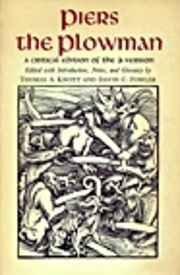

Carregue numa fotografia para ir para os Livros Google.
|
A carregar... Piers the Plowman: A Critical Edition of the A-Versionpor William Langland
 Nenhum(a) Ainda não há conversas na Discussão sobre este livro. sem críticas | adicionar uma crítica
The fourteenth-century Piers Plowman is one of the most influential poems from the Age of Chaucer. Following the character Will on his quest for the true Christian life, the three dream narratives that make up this work address a number of pressing political, social, moral, and educational issues of the late Middle Ages. Míċeál F. Vaughan presents a fresh edition of the A version, an earlier and shorter version of this great work. Unlike the B and C versions, there is no modern, affordable edition of the A version available. For the first time in decades, students and scholars of medieval literature now have access to this important work. Vaughan's clean, uncluttered text is accompanied by ample glossing of difficult Middle English words. An expansive introduction, which includes a narrative summary of the poem, textual notes, detailed endnotes, and a select bibliography frame the text, making this edition ideal for classroom use. This is the first classroom edition of the A version since Thomas A. Knott and David C. Fowler's celebrated 1952 publication. Based on an early-fifteenth-century manuscript from the University of Oxford's Bodleian Library, Vaughan's text offers a unique rendition of the poem, and it is the first modern edition not to attribute the poem to William Langland. By conservatively editing one important witness of Piers Plowman, Vaughan takes a new generation of students to an early version of this great medieval poem. Não foram encontradas descrições de bibliotecas. |
Current DiscussionsNenhum(a)Capas populares
 Google Books — A carregar... Google Books — A carregar...GénerosSistema Decimal de Melvil (DDC)821.1Literature English & Old English literatures English poetry 1066-1400 Early English period, medieval periodClassificação da Biblioteca do Congresso dos EUA (LCC)AvaliaçãoMédia: (5) (5)
É você?Torne-se num Autor LibraryThing. |
||||||||||||||||||||||||||||||||||||||||||||||||||||||||||||||||||||||||||||||||||||||||||||||||||||||||||||||||||||||||
I’ve heard the language described as ‘barbarous’. Don’t get overexcited, but there are times when the poetry attains that level of perfection. It’s consistently entertaining and interesting, though he could have done with editing down the Six Deadly Sins to maybe three or four...
It’s not what I expected. I think I expected something hoary and old because I knew it was alliterative, but this is cutting edge stuff (for the Middle Ages). It’s essentially a satire of Church and State and there’s some social commentary here sharp enough to explain why Langland might have been wary of putting his name to it.. Considering the uses the poem was put to during the Peasant’s Revolt and the Reformation it’s interesting to see what Langland isn’t saying. He isn’t calling for an end to the Church, but rather internal reform. But it’s clear why people would see this as a blueprint for more radical change. He envisages a renegotiation of the relationship between the three estates with those who work the most valuable and those who fight and pray doing so for the benefit of the workers. He appears to suggest some sort of ‘work-to-rule’ when the relationship is abused. In fact, he’s extremely conservative. He condemns all capitalist ventures and wants everyone to plough, pray, fight, or (if you’re a woman) sew. His hostility to people who don’t do one of these four things really is something to behold and he wants them to go back to their work. But the ‘work’ he condemns so many people to would today lead to a slew of prosecutions under the Modern Slavery Act.
Anyway, a quick word about editions. I had to do a bit of research because the A version isn’t as easily available as the B. You basically have a choice of four, not counting translations and parallel texts etc.
Skeat’s EETS edition (OS 28). I’m sure this is an editorial masterpiece, but the notes etc are all in a separate volume, OS 67, which is an embuggerance not to be endured.
Knott & Fowler’s Critical Edition. This details every textual variant in every manuscript. It does have the actual poem, but no glossary or notes or anything like that and is really just for scholars studying the text.
George Kane, Athlone Press 1960. This is intended for students and general readers and has notes and glossary and all the things human being require for a poem like this.
Míċeál F. Vaughan. This is the same approach as above. I’d have been happy with either of these, but went for this one as I had some book tokens and this is the only edition that can be bought with them.
You’ll notice that Langland is not credited as author either on the cover or title page. On sight I took this as a cynical attempt by Vaughan to get himself noticed in the field, but he uses this approach to make some extremely insightful comments about the nature of authorship and textual transmission in the Middle Ages. The introduction as a whole is superb. Really in-depth and thought provoking.
Excellent explanatory notes. I did wish I’d read a general history of the period because some of the satire is quite specific, but Vaughan does what he can in the space he has.
I do have a couple of complaints. The punctuation is far heavier than the English language requires. There is no separate glossary. I prefer Very Hard Words glossed in footnote with a separate glossary at the back. Instead we have double columned pages with the glosses on the right. My eye was constantly distracted by this second column. In the end I had to cover it with my bookmark. When the glosses run to a second line it breaks the poem’s text into stanzas. These breaks, and the punctuation so vast it had it’s own gravity field both constantly broke the flow of my reading. Other than this, perfect. (